Industry Sector Analysis
VerifiedAdded on 2019/10/18
|8
|1561
|308
Report
AI Summary
The food retail industry in Australia is a significant sector that contributes to the country's economy and employment generation. The market is driven by consumer demand for quality, value, and diversity, with major players being Woolworths, Coles, and Aldi. The industry faces challenges such as cost reduction, regulatory compliance, and maintaining quality and innovation while keeping prices low. However, Australia has strengths that can be leveraged to grow the industry, including its reputation for supplying natural and clean products, excellent research and development facilities, variety of produce, and a skilled workforce.
Contribute Materials
Your contribution can guide someone’s learning journey. Share your
documents today.
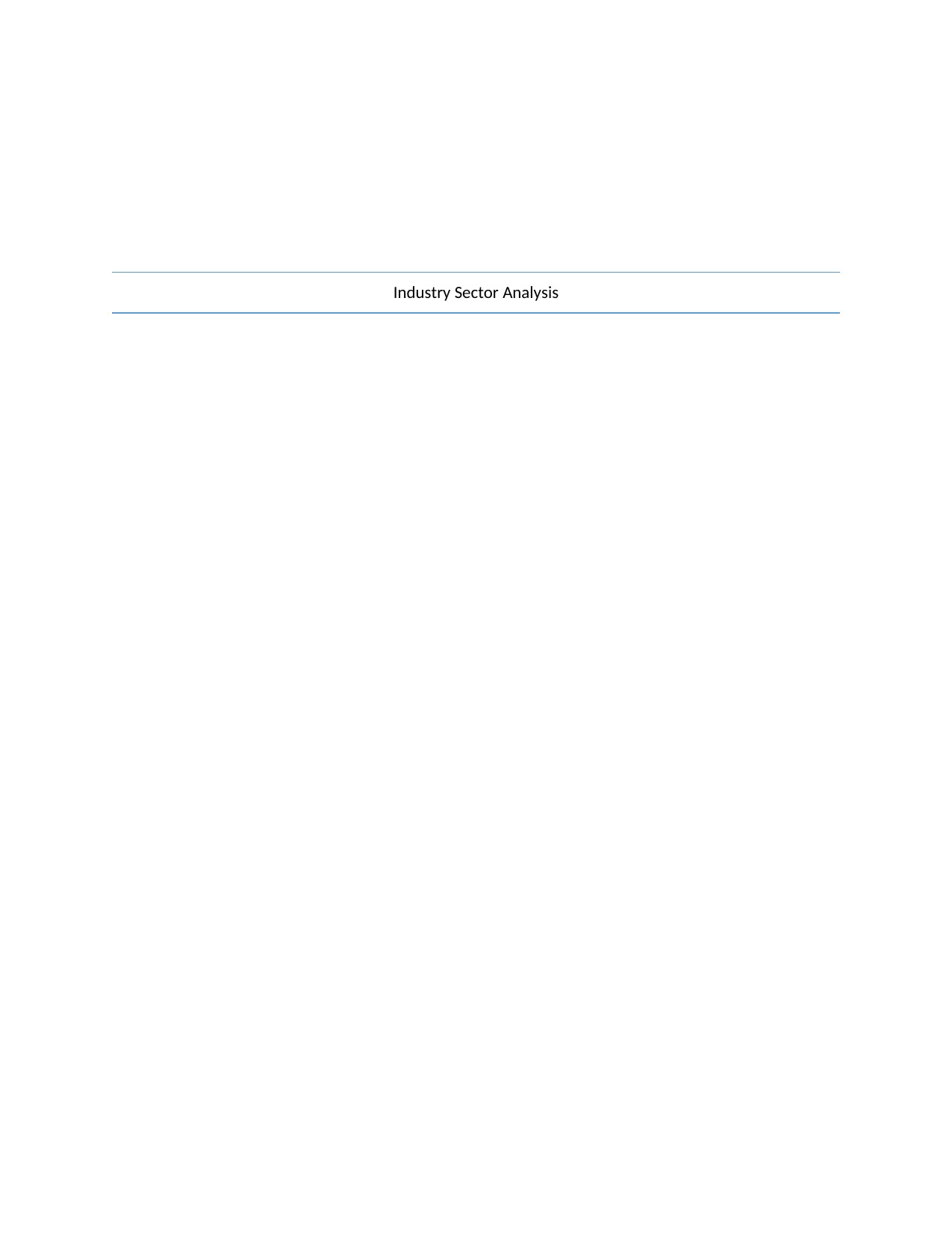
Industry Sector Analysis
Secure Best Marks with AI Grader
Need help grading? Try our AI Grader for instant feedback on your assignments.
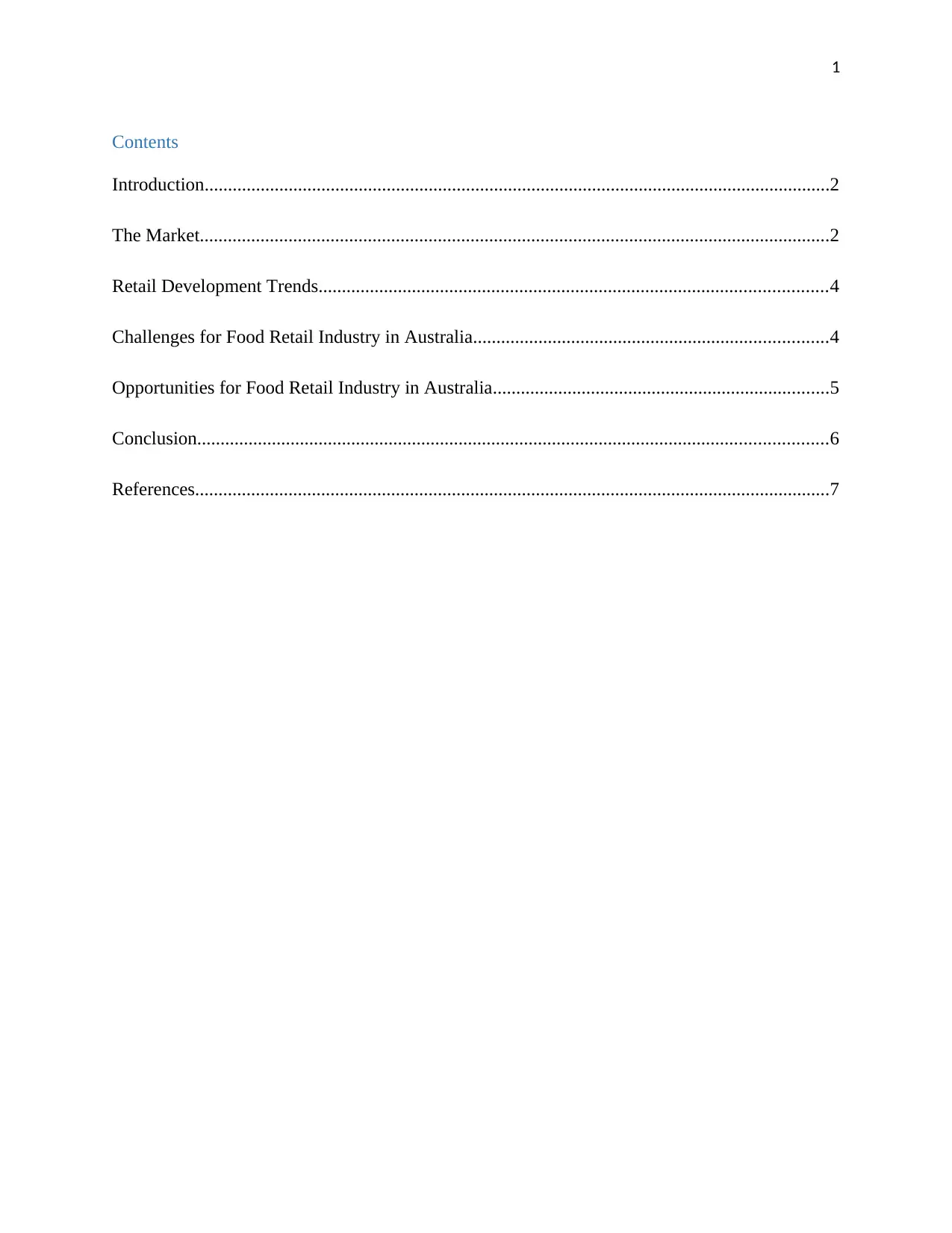
1
Contents
Introduction......................................................................................................................................2
The Market.......................................................................................................................................2
Retail Development Trends.............................................................................................................4
Challenges for Food Retail Industry in Australia............................................................................4
Opportunities for Food Retail Industry in Australia........................................................................5
Conclusion.......................................................................................................................................6
References........................................................................................................................................7
Contents
Introduction......................................................................................................................................2
The Market.......................................................................................................................................2
Retail Development Trends.............................................................................................................4
Challenges for Food Retail Industry in Australia............................................................................4
Opportunities for Food Retail Industry in Australia........................................................................5
Conclusion.......................................................................................................................................6
References........................................................................................................................................7
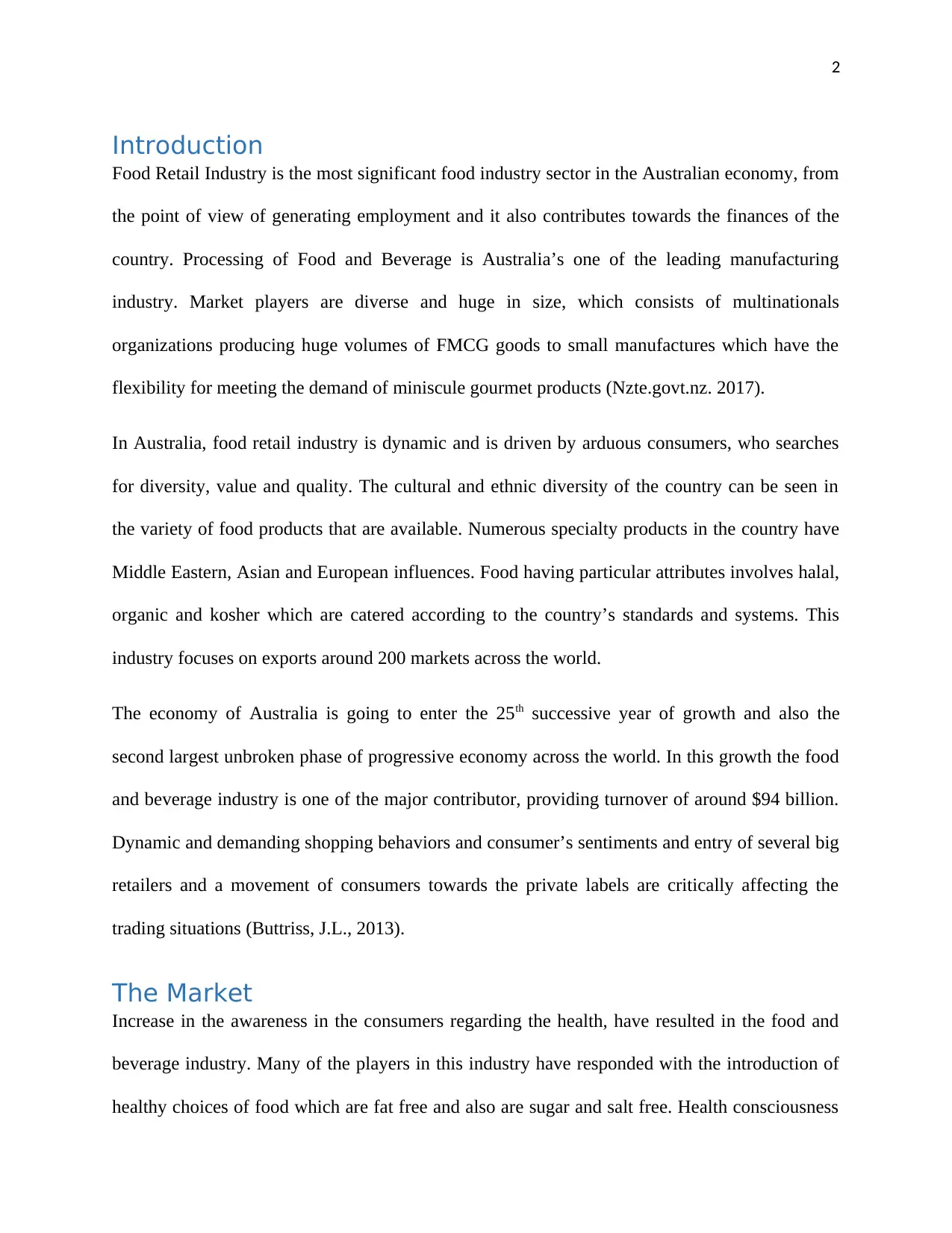
2
Introduction
Food Retail Industry is the most significant food industry sector in the Australian economy, from
the point of view of generating employment and it also contributes towards the finances of the
country. Processing of Food and Beverage is Australia’s one of the leading manufacturing
industry. Market players are diverse and huge in size, which consists of multinationals
organizations producing huge volumes of FMCG goods to small manufactures which have the
flexibility for meeting the demand of miniscule gourmet products (Nzte.govt.nz. 2017).
In Australia, food retail industry is dynamic and is driven by arduous consumers, who searches
for diversity, value and quality. The cultural and ethnic diversity of the country can be seen in
the variety of food products that are available. Numerous specialty products in the country have
Middle Eastern, Asian and European influences. Food having particular attributes involves halal,
organic and kosher which are catered according to the country’s standards and systems. This
industry focuses on exports around 200 markets across the world.
The economy of Australia is going to enter the 25th successive year of growth and also the
second largest unbroken phase of progressive economy across the world. In this growth the food
and beverage industry is one of the major contributor, providing turnover of around $94 billion.
Dynamic and demanding shopping behaviors and consumer’s sentiments and entry of several big
retailers and a movement of consumers towards the private labels are critically affecting the
trading situations (Buttriss, J.L., 2013).
The Market
Increase in the awareness in the consumers regarding the health, have resulted in the food and
beverage industry. Many of the players in this industry have responded with the introduction of
healthy choices of food which are fat free and also are sugar and salt free. Health consciousness
Introduction
Food Retail Industry is the most significant food industry sector in the Australian economy, from
the point of view of generating employment and it also contributes towards the finances of the
country. Processing of Food and Beverage is Australia’s one of the leading manufacturing
industry. Market players are diverse and huge in size, which consists of multinationals
organizations producing huge volumes of FMCG goods to small manufactures which have the
flexibility for meeting the demand of miniscule gourmet products (Nzte.govt.nz. 2017).
In Australia, food retail industry is dynamic and is driven by arduous consumers, who searches
for diversity, value and quality. The cultural and ethnic diversity of the country can be seen in
the variety of food products that are available. Numerous specialty products in the country have
Middle Eastern, Asian and European influences. Food having particular attributes involves halal,
organic and kosher which are catered according to the country’s standards and systems. This
industry focuses on exports around 200 markets across the world.
The economy of Australia is going to enter the 25th successive year of growth and also the
second largest unbroken phase of progressive economy across the world. In this growth the food
and beverage industry is one of the major contributor, providing turnover of around $94 billion.
Dynamic and demanding shopping behaviors and consumer’s sentiments and entry of several big
retailers and a movement of consumers towards the private labels are critically affecting the
trading situations (Buttriss, J.L., 2013).
The Market
Increase in the awareness in the consumers regarding the health, have resulted in the food and
beverage industry. Many of the players in this industry have responded with the introduction of
healthy choices of food which are fat free and also are sugar and salt free. Health consciousness
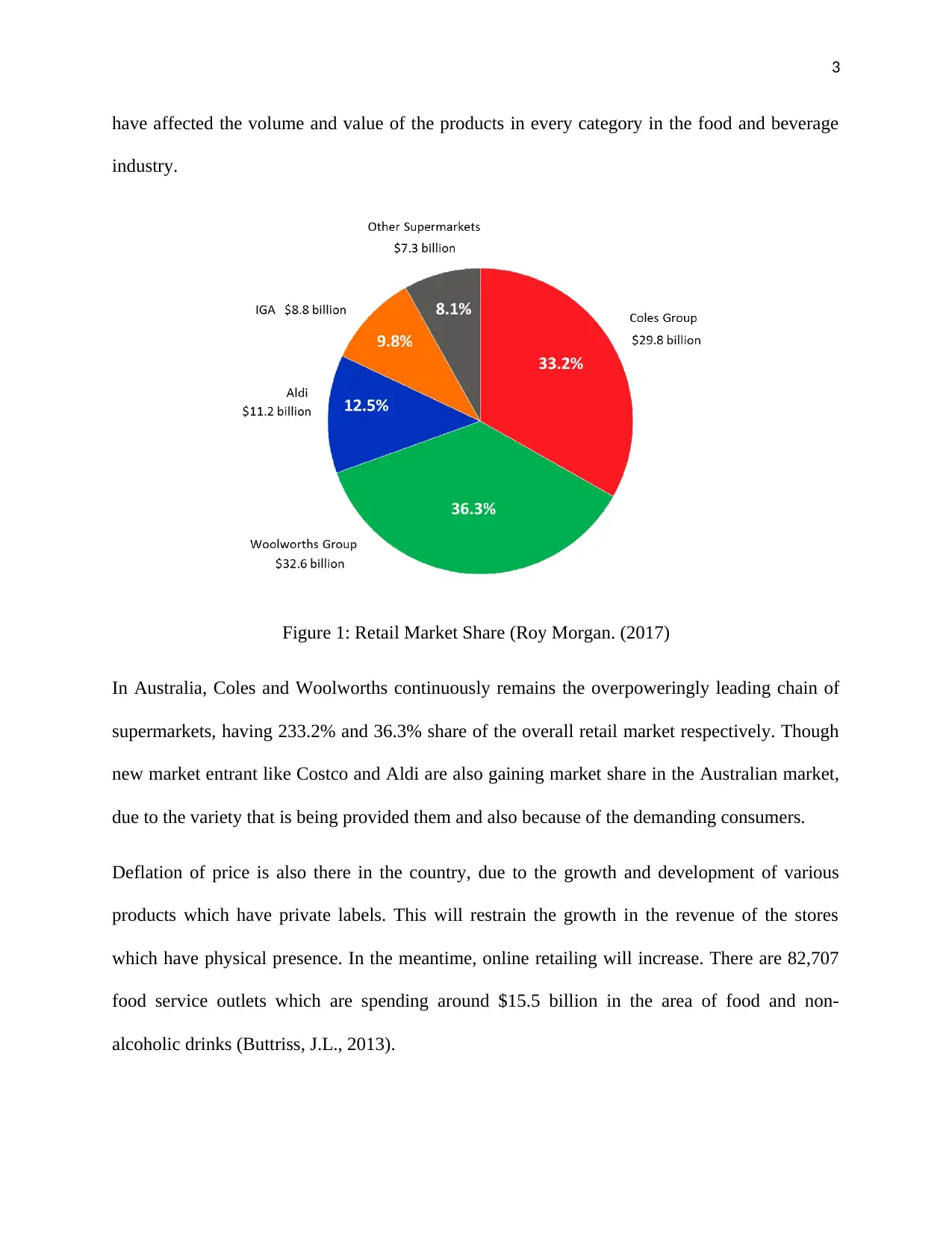
3
have affected the volume and value of the products in every category in the food and beverage
industry.
Figure 1: Retail Market Share (Roy Morgan. (2017)
In Australia, Coles and Woolworths continuously remains the overpoweringly leading chain of
supermarkets, having 233.2% and 36.3% share of the overall retail market respectively. Though
new market entrant like Costco and Aldi are also gaining market share in the Australian market,
due to the variety that is being provided them and also because of the demanding consumers.
Deflation of price is also there in the country, due to the growth and development of various
products which have private labels. This will restrain the growth in the revenue of the stores
which have physical presence. In the meantime, online retailing will increase. There are 82,707
food service outlets which are spending around $15.5 billion in the area of food and non-
alcoholic drinks (Buttriss, J.L., 2013).
have affected the volume and value of the products in every category in the food and beverage
industry.
Figure 1: Retail Market Share (Roy Morgan. (2017)
In Australia, Coles and Woolworths continuously remains the overpoweringly leading chain of
supermarkets, having 233.2% and 36.3% share of the overall retail market respectively. Though
new market entrant like Costco and Aldi are also gaining market share in the Australian market,
due to the variety that is being provided them and also because of the demanding consumers.
Deflation of price is also there in the country, due to the growth and development of various
products which have private labels. This will restrain the growth in the revenue of the stores
which have physical presence. In the meantime, online retailing will increase. There are 82,707
food service outlets which are spending around $15.5 billion in the area of food and non-
alcoholic drinks (Buttriss, J.L., 2013).
Secure Best Marks with AI Grader
Need help grading? Try our AI Grader for instant feedback on your assignments.
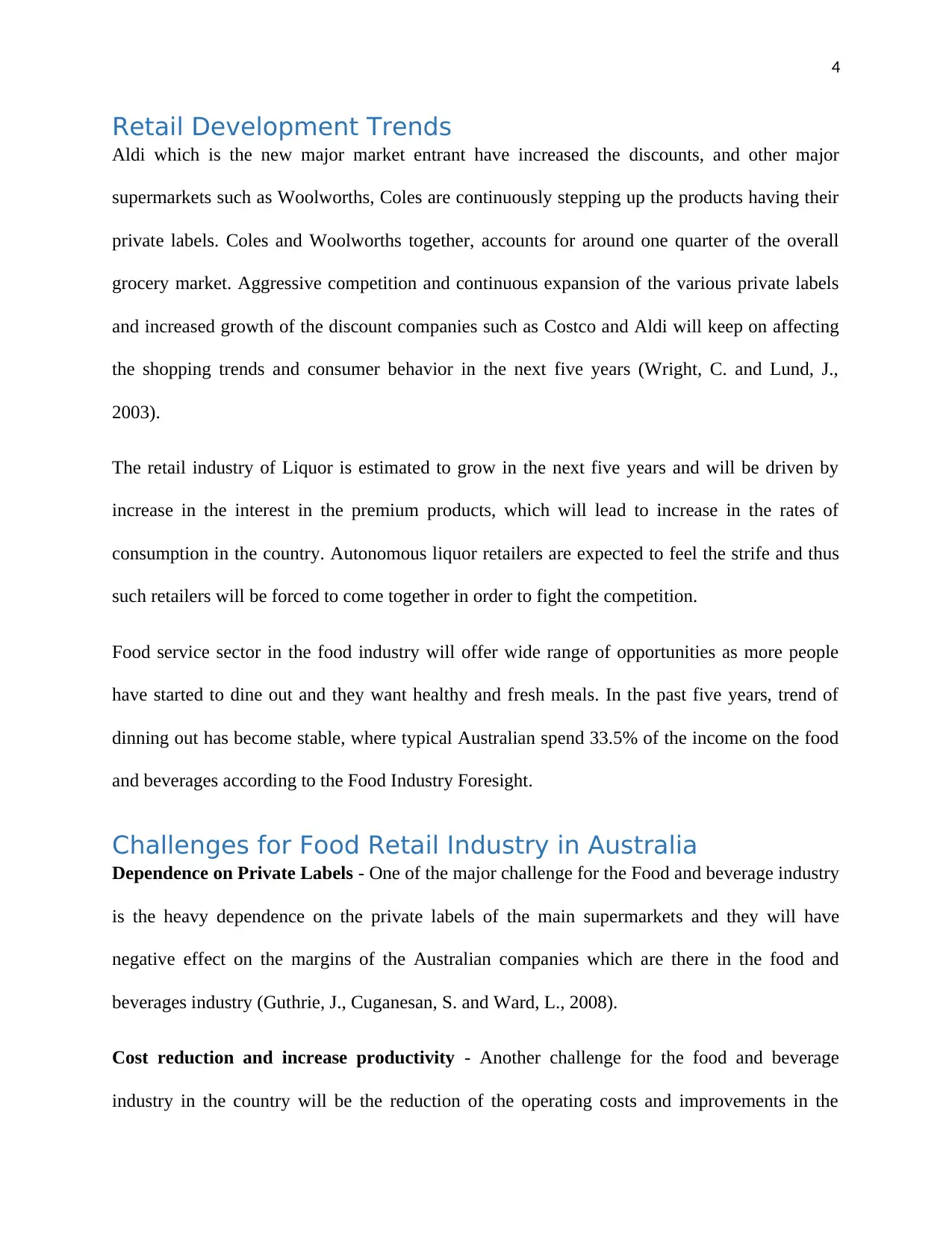
4
Retail Development Trends
Aldi which is the new major market entrant have increased the discounts, and other major
supermarkets such as Woolworths, Coles are continuously stepping up the products having their
private labels. Coles and Woolworths together, accounts for around one quarter of the overall
grocery market. Aggressive competition and continuous expansion of the various private labels
and increased growth of the discount companies such as Costco and Aldi will keep on affecting
the shopping trends and consumer behavior in the next five years (Wright, C. and Lund, J.,
2003).
The retail industry of Liquor is estimated to grow in the next five years and will be driven by
increase in the interest in the premium products, which will lead to increase in the rates of
consumption in the country. Autonomous liquor retailers are expected to feel the strife and thus
such retailers will be forced to come together in order to fight the competition.
Food service sector in the food industry will offer wide range of opportunities as more people
have started to dine out and they want healthy and fresh meals. In the past five years, trend of
dinning out has become stable, where typical Australian spend 33.5% of the income on the food
and beverages according to the Food Industry Foresight.
Challenges for Food Retail Industry in Australia
Dependence on Private Labels - One of the major challenge for the Food and beverage industry
is the heavy dependence on the private labels of the main supermarkets and they will have
negative effect on the margins of the Australian companies which are there in the food and
beverages industry (Guthrie, J., Cuganesan, S. and Ward, L., 2008).
Cost reduction and increase productivity - Another challenge for the food and beverage
industry in the country will be the reduction of the operating costs and improvements in the
Retail Development Trends
Aldi which is the new major market entrant have increased the discounts, and other major
supermarkets such as Woolworths, Coles are continuously stepping up the products having their
private labels. Coles and Woolworths together, accounts for around one quarter of the overall
grocery market. Aggressive competition and continuous expansion of the various private labels
and increased growth of the discount companies such as Costco and Aldi will keep on affecting
the shopping trends and consumer behavior in the next five years (Wright, C. and Lund, J.,
2003).
The retail industry of Liquor is estimated to grow in the next five years and will be driven by
increase in the interest in the premium products, which will lead to increase in the rates of
consumption in the country. Autonomous liquor retailers are expected to feel the strife and thus
such retailers will be forced to come together in order to fight the competition.
Food service sector in the food industry will offer wide range of opportunities as more people
have started to dine out and they want healthy and fresh meals. In the past five years, trend of
dinning out has become stable, where typical Australian spend 33.5% of the income on the food
and beverages according to the Food Industry Foresight.
Challenges for Food Retail Industry in Australia
Dependence on Private Labels - One of the major challenge for the Food and beverage industry
is the heavy dependence on the private labels of the main supermarkets and they will have
negative effect on the margins of the Australian companies which are there in the food and
beverages industry (Guthrie, J., Cuganesan, S. and Ward, L., 2008).
Cost reduction and increase productivity - Another challenge for the food and beverage
industry in the country will be the reduction of the operating costs and improvements in the
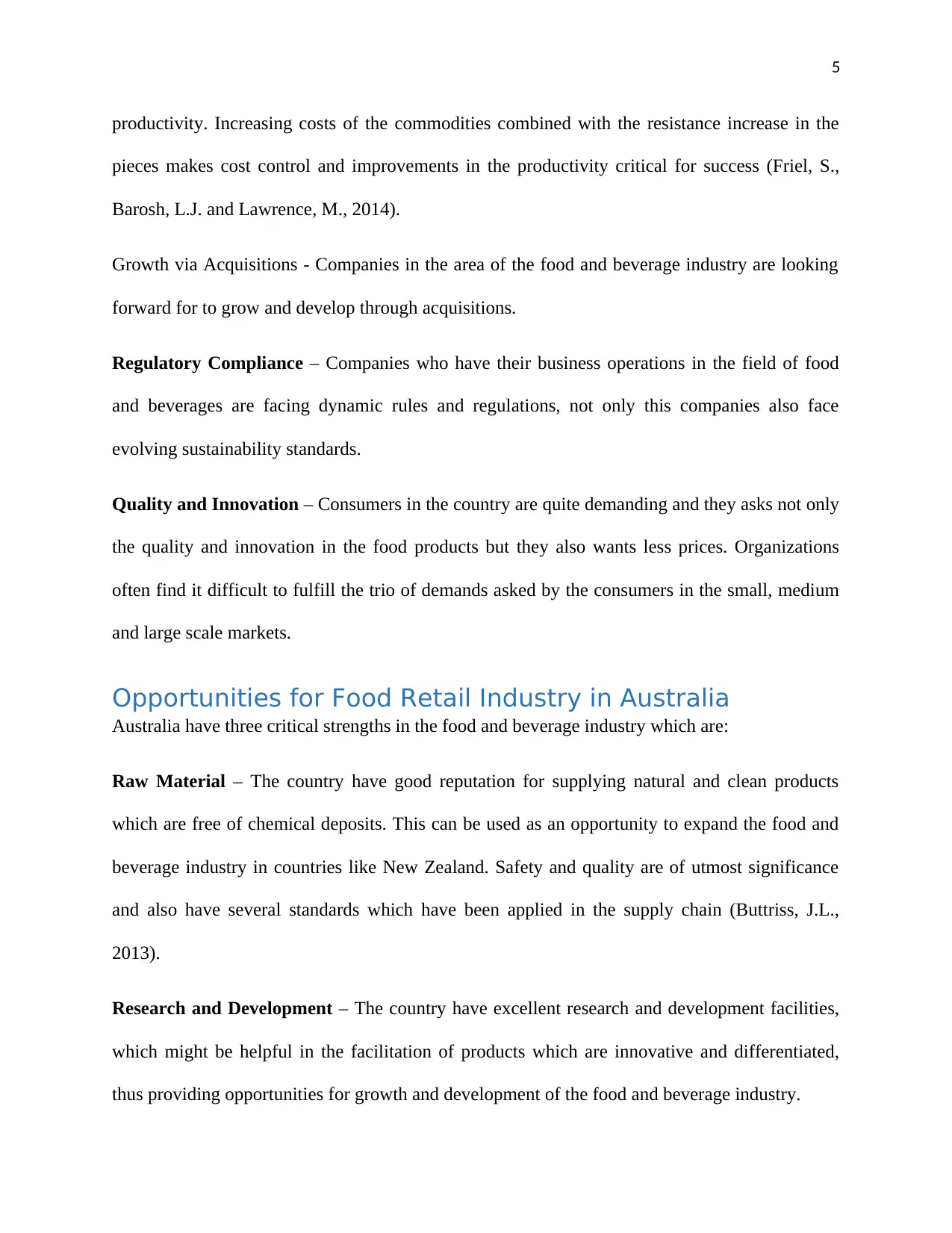
5
productivity. Increasing costs of the commodities combined with the resistance increase in the
pieces makes cost control and improvements in the productivity critical for success (Friel, S.,
Barosh, L.J. and Lawrence, M., 2014).
Growth via Acquisitions - Companies in the area of the food and beverage industry are looking
forward for to grow and develop through acquisitions.
Regulatory Compliance – Companies who have their business operations in the field of food
and beverages are facing dynamic rules and regulations, not only this companies also face
evolving sustainability standards.
Quality and Innovation – Consumers in the country are quite demanding and they asks not only
the quality and innovation in the food products but they also wants less prices. Organizations
often find it difficult to fulfill the trio of demands asked by the consumers in the small, medium
and large scale markets.
Opportunities for Food Retail Industry in Australia
Australia have three critical strengths in the food and beverage industry which are:
Raw Material – The country have good reputation for supplying natural and clean products
which are free of chemical deposits. This can be used as an opportunity to expand the food and
beverage industry in countries like New Zealand. Safety and quality are of utmost significance
and also have several standards which have been applied in the supply chain (Buttriss, J.L.,
2013).
Research and Development – The country have excellent research and development facilities,
which might be helpful in the facilitation of products which are innovative and differentiated,
thus providing opportunities for growth and development of the food and beverage industry.
productivity. Increasing costs of the commodities combined with the resistance increase in the
pieces makes cost control and improvements in the productivity critical for success (Friel, S.,
Barosh, L.J. and Lawrence, M., 2014).
Growth via Acquisitions - Companies in the area of the food and beverage industry are looking
forward for to grow and develop through acquisitions.
Regulatory Compliance – Companies who have their business operations in the field of food
and beverages are facing dynamic rules and regulations, not only this companies also face
evolving sustainability standards.
Quality and Innovation – Consumers in the country are quite demanding and they asks not only
the quality and innovation in the food products but they also wants less prices. Organizations
often find it difficult to fulfill the trio of demands asked by the consumers in the small, medium
and large scale markets.
Opportunities for Food Retail Industry in Australia
Australia have three critical strengths in the food and beverage industry which are:
Raw Material – The country have good reputation for supplying natural and clean products
which are free of chemical deposits. This can be used as an opportunity to expand the food and
beverage industry in countries like New Zealand. Safety and quality are of utmost significance
and also have several standards which have been applied in the supply chain (Buttriss, J.L.,
2013).
Research and Development – The country have excellent research and development facilities,
which might be helpful in the facilitation of products which are innovative and differentiated,
thus providing opportunities for growth and development of the food and beverage industry.
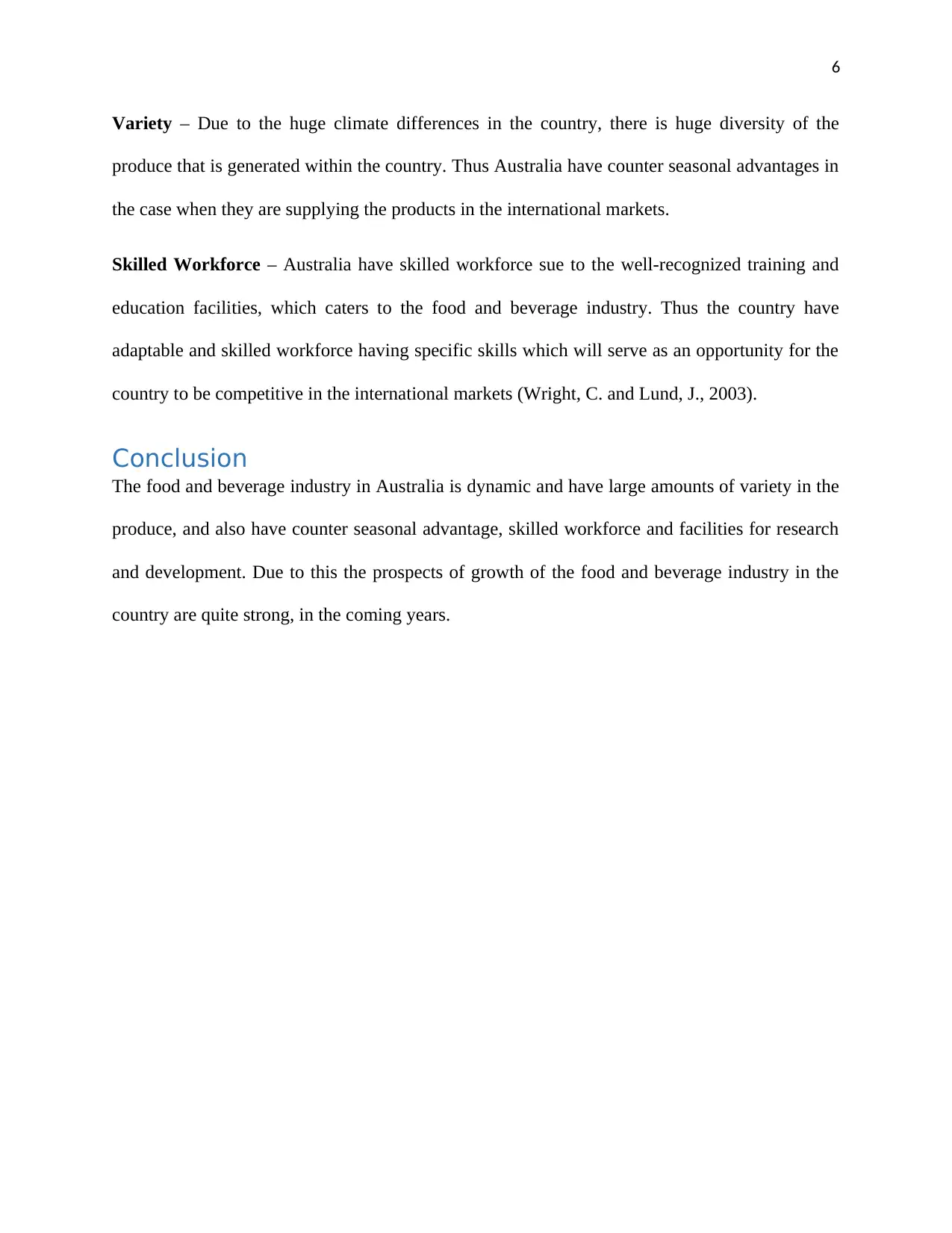
6
Variety – Due to the huge climate differences in the country, there is huge diversity of the
produce that is generated within the country. Thus Australia have counter seasonal advantages in
the case when they are supplying the products in the international markets.
Skilled Workforce – Australia have skilled workforce sue to the well-recognized training and
education facilities, which caters to the food and beverage industry. Thus the country have
adaptable and skilled workforce having specific skills which will serve as an opportunity for the
country to be competitive in the international markets (Wright, C. and Lund, J., 2003).
Conclusion
The food and beverage industry in Australia is dynamic and have large amounts of variety in the
produce, and also have counter seasonal advantage, skilled workforce and facilities for research
and development. Due to this the prospects of growth of the food and beverage industry in the
country are quite strong, in the coming years.
Variety – Due to the huge climate differences in the country, there is huge diversity of the
produce that is generated within the country. Thus Australia have counter seasonal advantages in
the case when they are supplying the products in the international markets.
Skilled Workforce – Australia have skilled workforce sue to the well-recognized training and
education facilities, which caters to the food and beverage industry. Thus the country have
adaptable and skilled workforce having specific skills which will serve as an opportunity for the
country to be competitive in the international markets (Wright, C. and Lund, J., 2003).
Conclusion
The food and beverage industry in Australia is dynamic and have large amounts of variety in the
produce, and also have counter seasonal advantage, skilled workforce and facilities for research
and development. Due to this the prospects of growth of the food and beverage industry in the
country are quite strong, in the coming years.
Paraphrase This Document
Need a fresh take? Get an instant paraphrase of this document with our AI Paraphraser
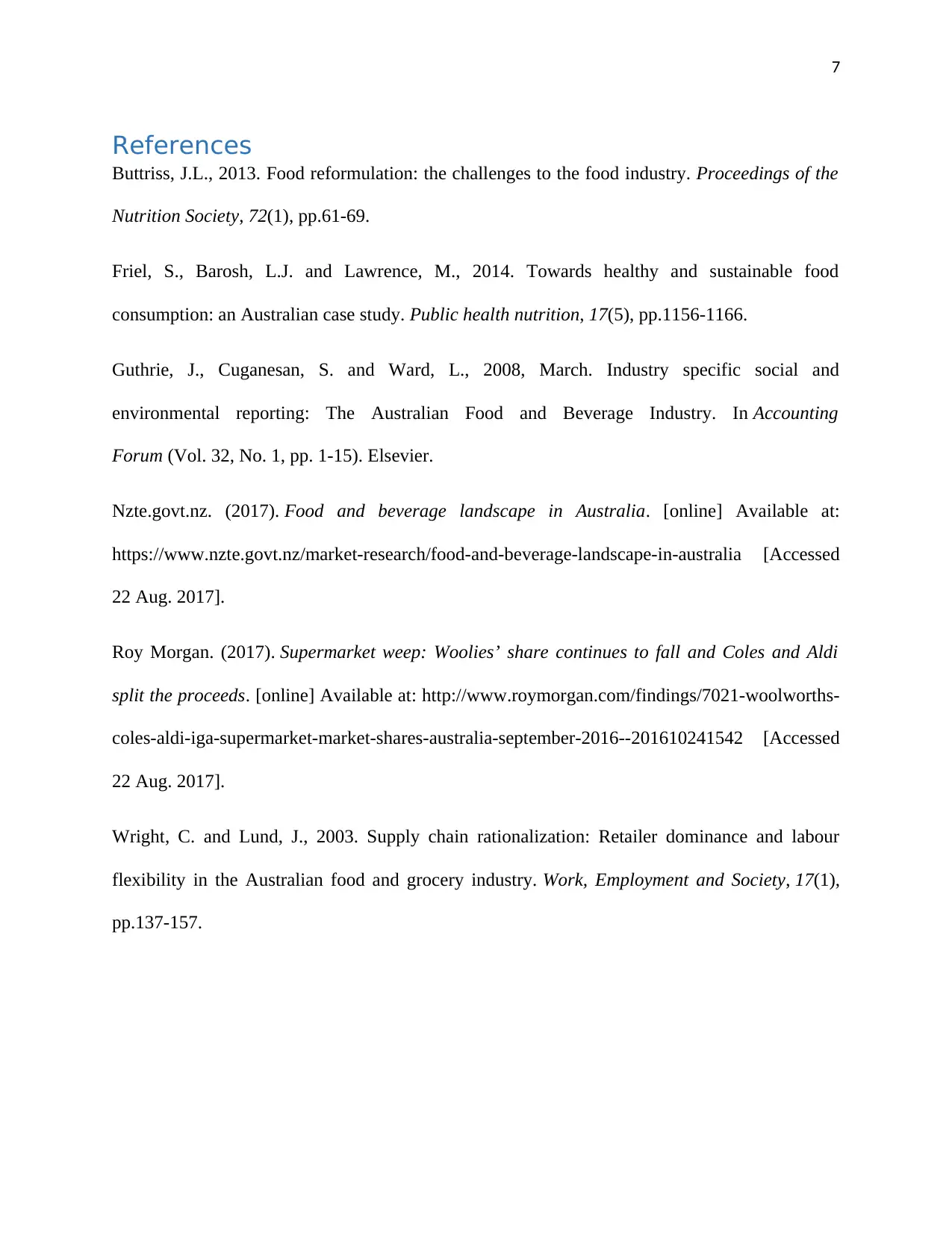
7
References
Buttriss, J.L., 2013. Food reformulation: the challenges to the food industry. Proceedings of the
Nutrition Society, 72(1), pp.61-69.
Friel, S., Barosh, L.J. and Lawrence, M., 2014. Towards healthy and sustainable food
consumption: an Australian case study. Public health nutrition, 17(5), pp.1156-1166.
Guthrie, J., Cuganesan, S. and Ward, L., 2008, March. Industry specific social and
environmental reporting: The Australian Food and Beverage Industry. In Accounting
Forum (Vol. 32, No. 1, pp. 1-15). Elsevier.
Nzte.govt.nz. (2017). Food and beverage landscape in Australia. [online] Available at:
https://www.nzte.govt.nz/market-research/food-and-beverage-landscape-in-australia [Accessed
22 Aug. 2017].
Roy Morgan. (2017). Supermarket weep: Woolies’ share continues to fall and Coles and Aldi
split the proceeds. [online] Available at: http://www.roymorgan.com/findings/7021-woolworths-
coles-aldi-iga-supermarket-market-shares-australia-september-2016--201610241542 [Accessed
22 Aug. 2017].
Wright, C. and Lund, J., 2003. Supply chain rationalization: Retailer dominance and labour
flexibility in the Australian food and grocery industry. Work, Employment and Society, 17(1),
pp.137-157.
References
Buttriss, J.L., 2013. Food reformulation: the challenges to the food industry. Proceedings of the
Nutrition Society, 72(1), pp.61-69.
Friel, S., Barosh, L.J. and Lawrence, M., 2014. Towards healthy and sustainable food
consumption: an Australian case study. Public health nutrition, 17(5), pp.1156-1166.
Guthrie, J., Cuganesan, S. and Ward, L., 2008, March. Industry specific social and
environmental reporting: The Australian Food and Beverage Industry. In Accounting
Forum (Vol. 32, No. 1, pp. 1-15). Elsevier.
Nzte.govt.nz. (2017). Food and beverage landscape in Australia. [online] Available at:
https://www.nzte.govt.nz/market-research/food-and-beverage-landscape-in-australia [Accessed
22 Aug. 2017].
Roy Morgan. (2017). Supermarket weep: Woolies’ share continues to fall and Coles and Aldi
split the proceeds. [online] Available at: http://www.roymorgan.com/findings/7021-woolworths-
coles-aldi-iga-supermarket-market-shares-australia-september-2016--201610241542 [Accessed
22 Aug. 2017].
Wright, C. and Lund, J., 2003. Supply chain rationalization: Retailer dominance and labour
flexibility in the Australian food and grocery industry. Work, Employment and Society, 17(1),
pp.137-157.
1 out of 8
Related Documents
Your All-in-One AI-Powered Toolkit for Academic Success.
+13062052269
info@desklib.com
Available 24*7 on WhatsApp / Email
![[object Object]](/_next/static/media/star-bottom.7253800d.svg)
Unlock your academic potential
© 2024 | Zucol Services PVT LTD | All rights reserved.





